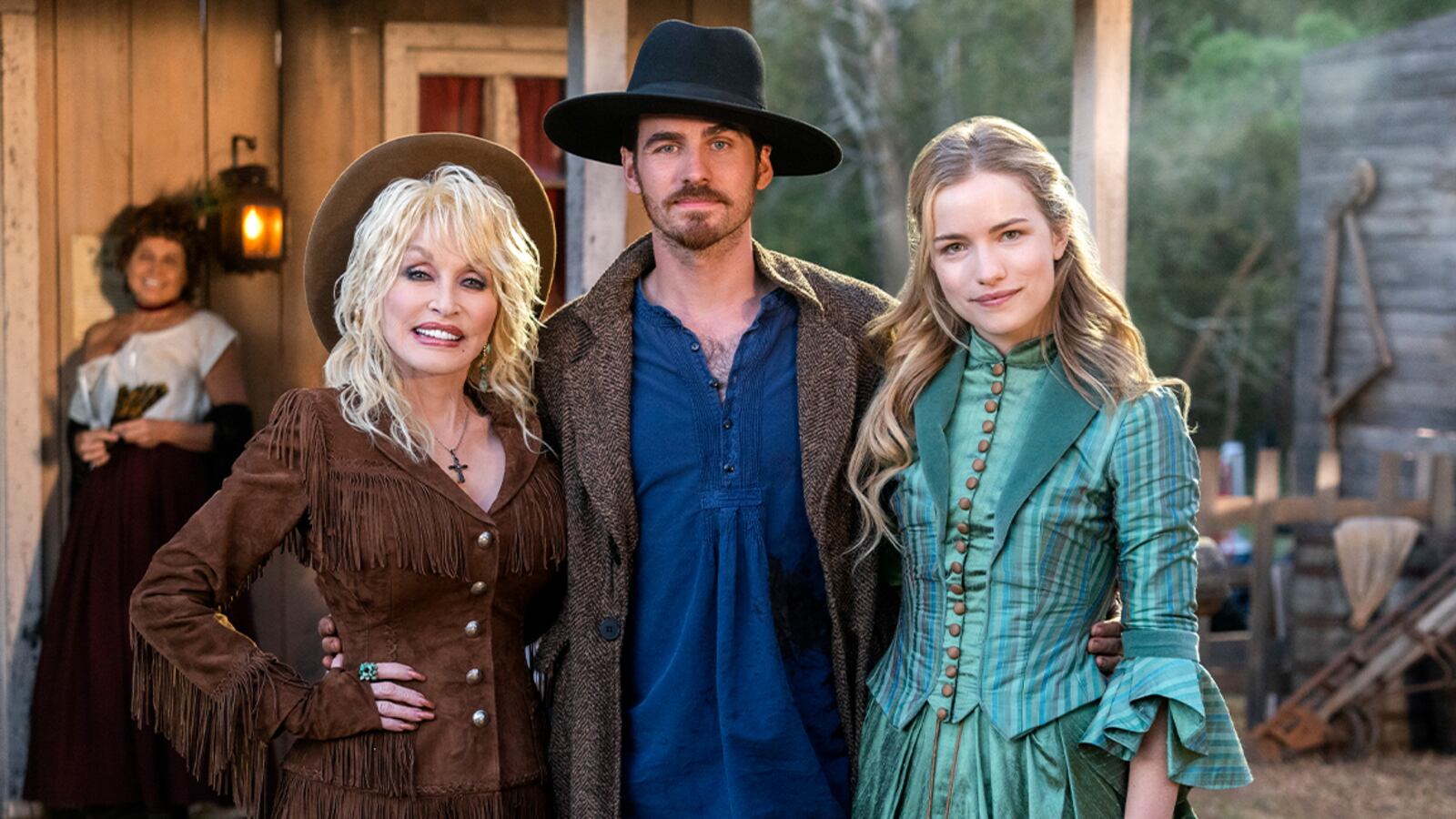The most objectionable thing about Dolly Parton’s Heartstrings is its length. There is no good reason why even an excellent show adapted from three-minute-long country songs would need to have 80-minute long episodes. That the new Netflix anthology series is far from excellent makes the egregious, narcolepsy-inducing episode length even less justifiable.
Each of the eight episodes of Dolly Parton’s Heartstrings is a standalone story based on one of Parton’s songs, including “Jolene,” “These Old Bones,” and “JJ Sneed.” Each episode is named after a song and, based on the two made available for review, the plots rarely stray from the original lyrics. The result, eight fully fleshed-out mini movies, is a testament to Parton’s deft lyrical storytelling abilities. That said, the moralistic yarns she weaves with such personality and sincerity simply sing more (pun intended) as soulful country songs, rather than as sluggish hour-plus-long television episodes.
The series is hosted by the bedazzled country diva herself, who introduces each installment from a theater in Dollywood, explaining the real-life events that inspired her to write the songs. In her Appalachian theme park palace, Parton poses for the camera wearing rhinestone-encrusted evening gowns and offers sage wisdom like, “We’ve all felt insecure about something. We’ve all felt like we might lose someone we love to someone else because we’re not good enough.” It’s pure camp, and it’s the best part of the show.
In the first episode, Julianne Hough plays Jolene, Dolly’s iconic temptress with “ivory skin and eyes of emerald green.” Hough’s Jolene is a honky tonk bartender/aspiring singer with fiery hair and the lacy bralette collection of someone who robbed a Free People store. For this modern retelling of the 1974 song, Jolene has been recast as a third-wave feminist “who does what she wants, who she wants, when she wants.” At least, this is the justification she offers her boss (Parton, with a spectacular wardrobe of metallic blue corsets) for sleeping with married assholes.
Parton’s decades-old story of jealousy at a beautiful woman she fears might steal her husband benefits from an updated telling that refocuses Jolene not as an enemy, but as a victim of unfair judgment and hypocritical moral standards. It’s particularly stirring when Hough croons the lyrics to another canonical Dolly song, “My mistakes are no worse than yours just because I’m a woman.” Much of the episode smartly focuses on the deep bond between Jolene and Emily (Kimberly Williams-Paisley), the wide-eyed housewife character who represents the song’s narrator. And luckily, Dolly appears on screen every so often to resuscitate a meandering plot with the sparkly, sassy, feminine fun that fans will likely be expecting from a show with her name attached.

Unfortunately, the second, disappointingly Dolly-free episode is mostly just 86-minutes of snooze-worthy sentimentality—despite boasting Kathleen Turner and Ginnifer Goodwin in lead roles. In “These Old Bones,” Turner does her very best (which is pretty darn good) with the treacly source material as a clairvoyant hill woman being sued by a major corporation for interfering with a land deal. Goodwin plays the career-driven lawyer tasked with returning to her hometown to cross-examine this poor old woman who just wants to milk her goats in peace. There’s a hint of a love story, plenty of To Kill A Mockingbird-esque courtroom scenes, and a big twist ending, but it’s still stiflingly predictable. Like, very predictable if you know the lyrics to the song. I did audibly chortle when Turner’s character is served with the lawsuit and in response grumbles, “Tell ‘em I ain’t interested!”

The fatal flaw of Dolly Parton’s Heartstrings is the dichotomy between the content and the platform. It often feels like a Lifetime movie—granted, a shockingly well-acted one—between the bad wigs and the computer game graphics. Yet it has the platform, relatively high-profile cast, and gratuitous length of a big-budget prestige drama. This clear disconnect is the source of Heartstrings’ problems. If the show truly did premiere on Lifetime, the network of made-for-TV true crime movies starring retired soap opera actresses, I would be singing its praises just for landing Kathleen Turner alone. Ultimately, the issue is not that Dolly Parton’s Heartstrings is especially bad; it’s that it failed to live up to its lofty streaming-era aspirations.





